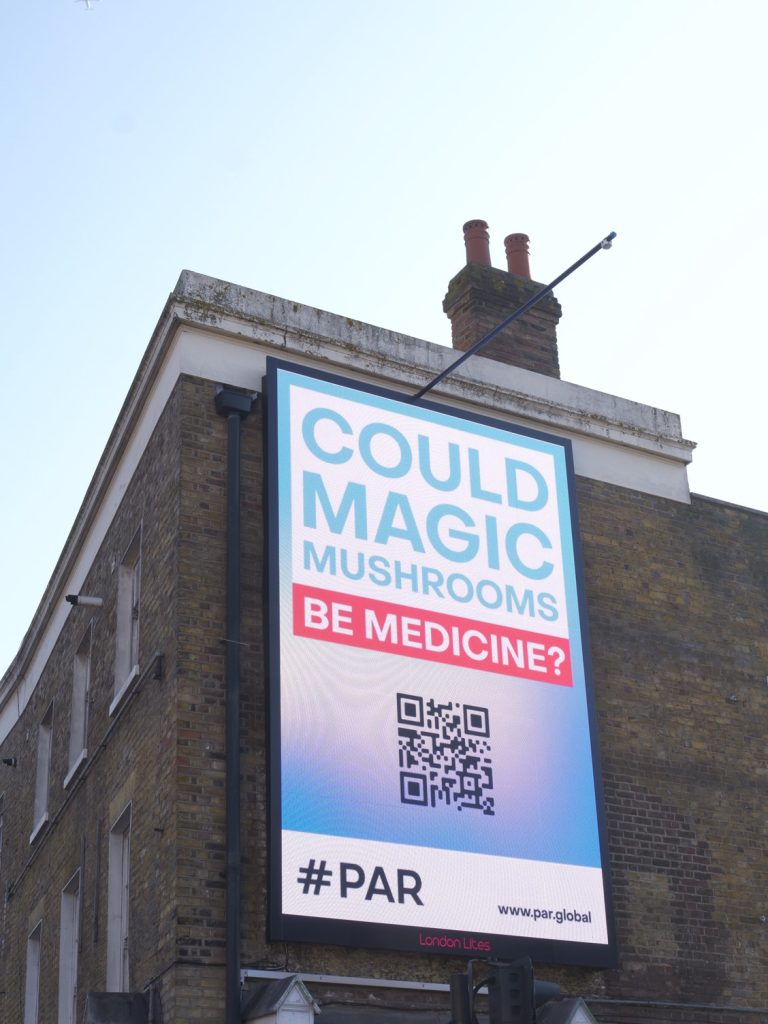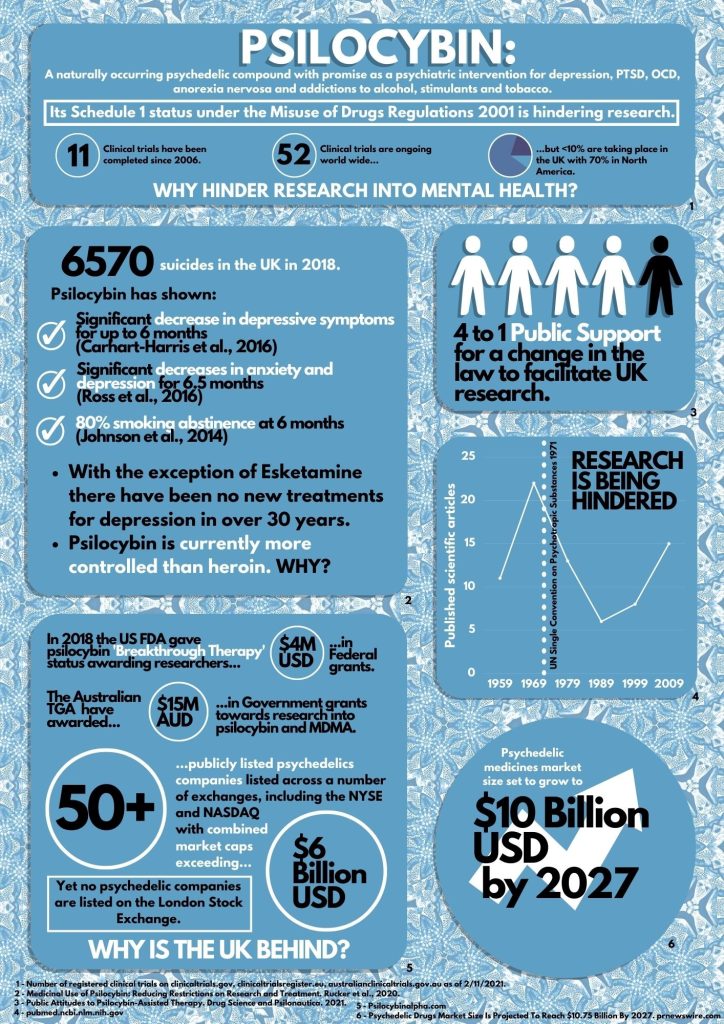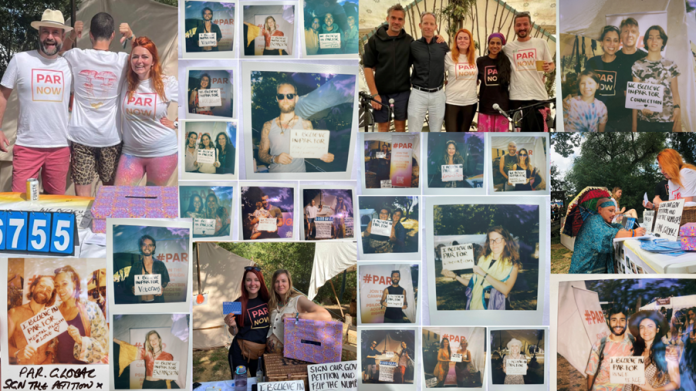Timmy Davis, policy director at the Psilocybin Access Rights Campaign (PAR), has been pivotal in catalysing a new wave of public discourse about the potential medicinal properties of psilocybin, the naturally occurring compound found in magic mushrooms.
When asked about his journey with PAR, Davis shared that his initial involvement began as a psilocybin rescheduling project manager at the Conservative Drug Policy Reform Group (CDPRG).
“Our initial belief was that it would be a straightforward process. We had planned to approach the Minister with the growing body of emerging research advocating the benefits of psilocybin. However, our proposal for rescheduling the drug to make it easier for researchers was met with a request for more evidence,” Davis explained.
Faced with unforeseen complications, the team began to diversify its approach, coupling parliamentary work with a more public-facing campaign.
Thus, the Psilocybin Access Rights Campaign was born.
“We wanted a platform that gave the public, who were demanding access, a voice. But we also aimed to increase awareness and pressure the Minister into action,” Davis shared.
The PAR campaign
As the campaign expanded, they decided it would be best to operate separately from CDPRG, with Davis taking on the role of policy director.
When asked about the team behind PAR, Davis painted a vibrant picture of a dedicated community. “We have a diverse group of volunteers including lawyers, students, and social prescribing professionals. It’s a beautiful mix of people who have also managed to secure a significant amount of pro bono work in areas like brand identity and advertising,” he added.
One of the campaign’s significant strides has been the successful launch of a government petition which secured over 11,000 signatures.
While the government response remained the same as previous encounters with the CDPRG, it did not deter the group from continuing to lobby for access to psilocybin.
The dynamics of the volunteer team at PAR are somewhat fluid. “We operate with a weekly meeting where volunteers can discuss what they can contribute to the campaign. The size of the group varies from about five to fifteen people, depending on availability,” Davis explains.

In terms of daily campaigning activities, Davis shared that they are currently focused on planning their next event for Magic Mushroom Day on the 20th of September.
The group aims to host a gallery and art auction to raise funds for future awareness-raising activities and to increase pressure on the Minister to act on their demands.
“In parallel, we’re looking beyond the present. We’re preparing for a future where psilocybin receives market authorization. One of the challenges we’re focusing on is ensuring fair access and reducing costs for patients post-authorization,” said Davis.
What can PAR learn from elsewhere?
Drawing from past experiences with medical cannabis, Davis expressed the importance of avoiding a two-tier system, where access is determined by private prescription costs versus NHS coverage.
In an international context, the work of their counterparts in the US, Canada, and Australia provides some guidance. “While we can learn a lot from these frontrunners, our healthcare systems and legislative processes differ significantly. Our major focus is on reducing costs while ensuring patients’ safety and maximising benefits,” Davis noted.
In considering future models of access to psilocybin, Davis emphasised the need for flexibility and cost efficiency.
He highlighted the possibilities of group access, nature-based settings, and trained guides rather than more expensive professionals.
By learning from the different models in places like Oregon and Australia, Davis maintains that PAR must think in a nuanced way. “Our aim is to create an effective model that not only provides access but also satisfies the requirements for recommendation by the National Institute for Health and Care Excellence (NICE).”
From Davis’s perspective, the most formidable challenge has been stirring political action. As he observes, “You can present the arguments as much as you like… But until there’s political will, they’re not going to move.”
Successes and challenges
Though the battle may be uphill, the group has celebrated considerable triumphs.
One of the most impactful has been their billboard campaign, igniting a conversation across the country by asking, “Could magic mushrooms be medicine?” The intention, Davis explains, was “not asserting that they can. We’re just saying we should allow the research to happen.”
This approach was instrumental in bringing this dialogue to the fore, inviting public engagement and sparking debate.
Another significant victory for PAR was the backbench business debate held in May, a collaboration with the CDPRG. Davis enthusiastically recalls, “26 members of Parliament from all different groups” engaging in a “debate on access to psilocybin.”
This dialogue was a historical landmark, being the first of its kind since the 1970s.
Although the group’s efforts have been met with bureaucratic roadblocks, Davis remains hopeful.
He anticipates that the ACMD’s review will ultimately lift restrictions on research into psychedelics.
Nevertheless, he candidly shares the frustration of seeing psilocybin “remain in schedule one, essentially perpetuating this 50-year injustice.”
Recently, the group has shifted its stance from posing a question to demanding action.
Davis declares, “People need access now,” underlining the mounting evidence over the past three years which supports the therapeutic benefits of psilocybin.
As demand rises, so does the risk of unregulated use.
As such, Davis advocates that the government should enable “the prescription of these drugs so that they can be accessed in safe, controlled settings in the presence of trained, accountable professionals.”
Public response to these efforts has been overwhelmingly positive. Davis cites his experience at the Conservative Party conference, where he found “almost everybody” to be supportive.

In a poll exploring public support for changes in psilocybin law, “59% said yes, we do,” a figure that leaps to 68% when reminded that Canadians already have access.
This leaves Davis with the impression that it is “increasingly difficult to find anybody to convince outside the Home Office.”
Discussing the next stages of PAR’s campaign, Davis emphasises the importance of continuing to amplify personal stories. His vision is to spotlight individuals dealing with conditions like depression, PTSD, or end-of-life anxiety, stating, “Look like why aren’t we allowed access? It’s good enough for the Canadians. It’s good enough for the Americans. It’s good enough for the Australians. Why not for us?”


